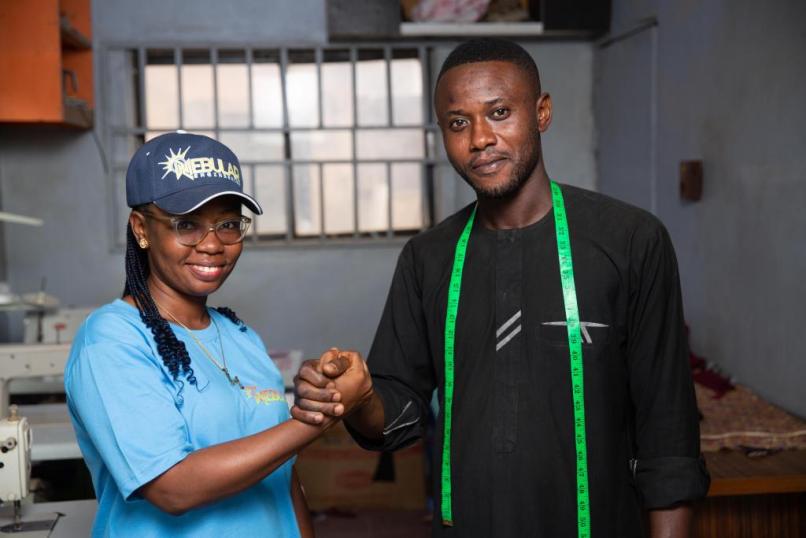Our commitment to gender equality and women’s empowerment means that we integrate gender considerations into our core and external programmes to ensure that women, men, girls, and boys benefit equitably from the energy transition. In line with the UN Sustainable Development Goal promise to leave no one behind and promote gender equality and women’s empowerment, we focus on gender equity to guarantee that women and men have equal opportunity for employment in the sustainable energy sector, that their voices and perspectives are meaningfully represented in leadership and decision-making roles, that they have equal access to sustainable and modern energy services; and that they benefit equitably from the energy transition. The organizational gender principles outlined below define our commitment to gender equality and guide our decision-making.
Our Gender Equality and Women’s Empowerment Principles:
- Our commitment to gender equality and women’s empowerment is reflected in our internal policies and practices, as well as our efforts to advance sustainable and modern energy for all.
- We are committed to gender-responsive design and implementation in our programmes and projects. We seek to meaningfully include women in the energy transition and promote equitable, sustainable, and modern energy access for women and men.
- We seek to amplify the voices of women and girls at all levels – including as leaders and decision-makers, entrepreneurs, stakeholders, and students – in advancing access to affordable, reliable, sustainable, and modern energy for all by 2030, in line with the Paris Agreement.
- We are committed to continuous learning and improvement on gender and climate, development, and energy through internal training, the collection and analysis of sex-disaggregated data, and the sharing of lessons learned within our sector.
- We recognize that women are a diverse group and that there are intersectional factors in gender inequality. These factors include age, race, socioeconomic class, sexual orientation, gender identity, disability status, and more.
Our Approach
We implement our Gender Equality and Women’s Empowerment principles using the following approach:
We mainstream gender in our core and external programmes. To operationalize our gender principles internally, we make gender mainstreaming part of our organizational ethos. This includes establishing a common understanding of gender mainstreaming, a clear approach with well-defined procedures, processes, and tools, accountability mechanisms, and dedicated financial and human resources. We seek feedback on the status and progress of gender equality and women's empowerment in the organization. To amplify our impact and model the behaviours we hope to see from our partners, we integrate gender considerations across our external programmes, throughout the project lifecycle— from design and implementation to monitoring and evaluation through the development of gender-sensitive indicators and measures and gender-responsive funding mechanisms.
We implement gender-responsive activities. Our work challenges gender-based social norms and stereotypes and promotes gender equality. We actively seek to engage women as stakeholders, and create opportunities for women to succeed as leaders, entrepreneurs, and decision-makers through capacity-building activities such as trainings, mentorship, and internships, both within SEforALL’s organizational structure and externally in our programmes and projects. We are committed to ensuring gender diversity is evident in SEforALL’s leadership and decision-making positions, fostering a diverse workplace culture grounded in shared values and respect. By prioritizing the needs and perspectives of women in our programming, we can build more inclusive and equitable communities and organizations.
We promote gender-balanced advocacy and events. We believe a diverse and inclusive approach to our initiatives is essential for driving meaningful change toward a clean energy transition. In line with this commitment, we strive to ensure that our communications and events elevate and amplify the voices of women and gender-diverse individuals in the energy sector. By fostering gender-balanced representation and participation, we aim to address the historical gender disparities in the industry and create a more equitable and inclusive future. By advocating for policies and practices that promote gender equality in the energy sector at local, national, and international levels, we aim to ensure that the benefits of a clean energy transition are experienced equitably by women, men, boys, and girls.
We cultivate partnerships that reflect our commitment to gender equality. Our partners reflect our gender equality and women’s empowerment principles; collectively, we work to advance these principles in the sector. We aim to establish new partnerships with organizations that share our commitment to gender equality. This includes organizations that promote gender-inclusive leadership, engage in gender-responsive initiatives both internally and externally, and incorporate gender considerations in program design, implementation, and evaluation. We seek to advance partnerships with those committed to flexible gender-responsive budgeting and financing to ensure that gender perspectives are integrated within all policies, projects, and programmes.

